This is the second post in an ongoing series about getting started with Peacemaker Parenting. We recommend that you check out the first post, Hard Questions.
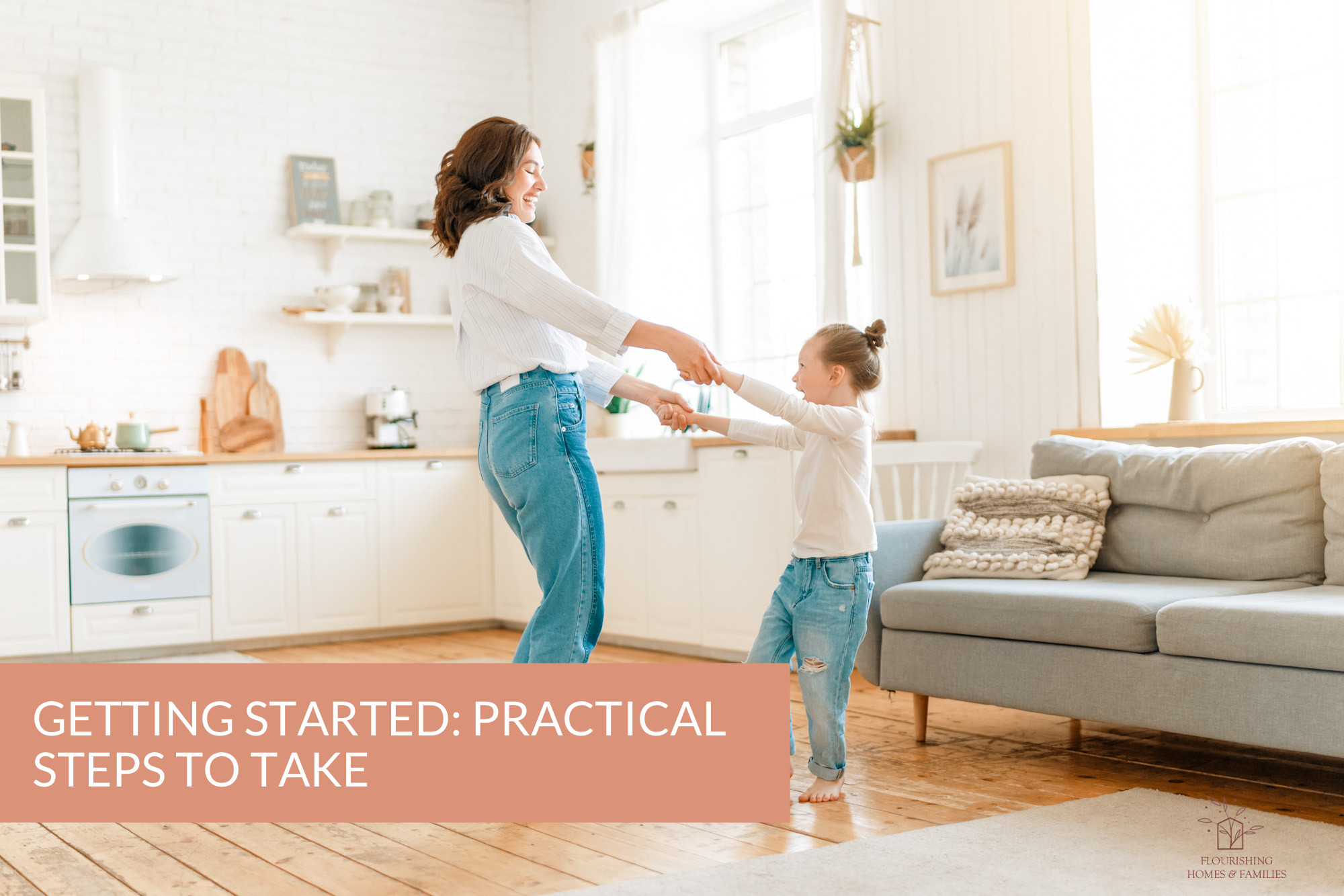
Sometimes, even when we make a big decision for something we know needs changing, it can feel just as big (maybe even bigger) to take the steps toward making that change.
Let’s look at some practical examples of gentle + attainable steps you can make as a new peacemaker parent…
Change what needs to happen
Evaluating your goals is helpful, but sometimes it is tempting to make "all or nothing" goals. When you do, try turning them into realistic first, or daily, steps:
Here's an example: changing your yelling habit:
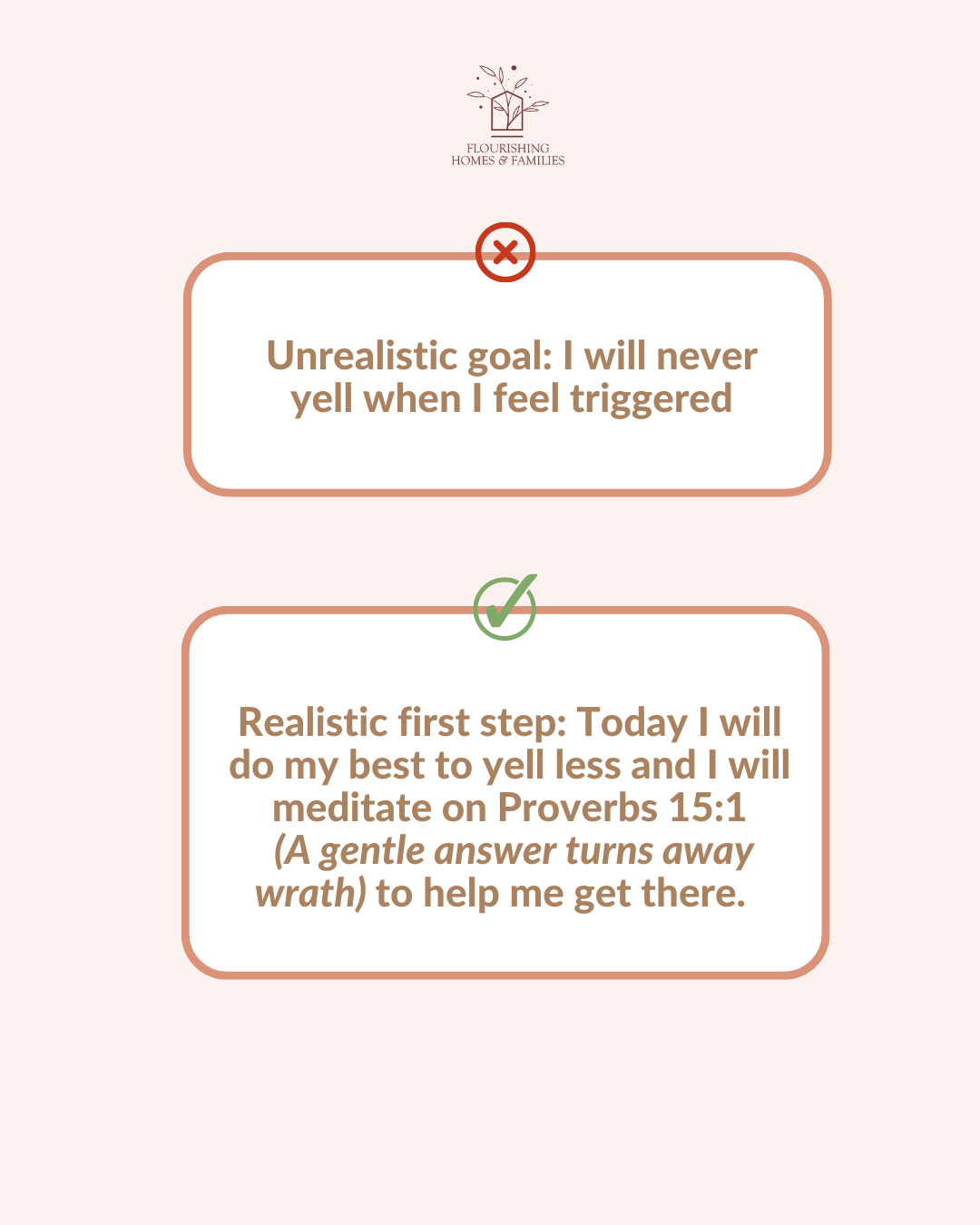
Here's another example: Changing your insecurity in what others think about your parenting choices:
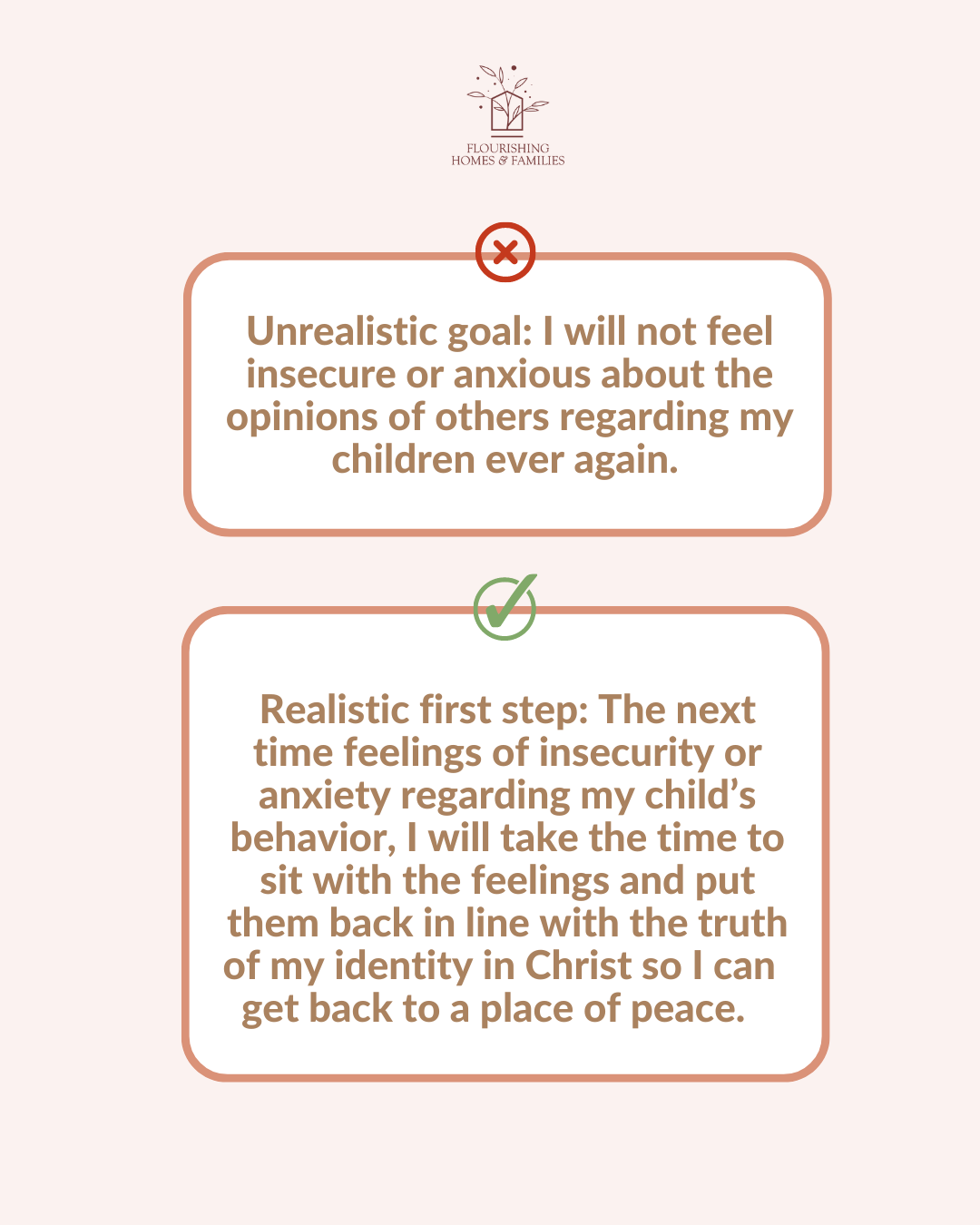
It is okay to struggle as a parent. We don’t have a “opt out of struggles” option in the parent game. It’s a given. But we DO get to choose how we navigate those struggles and turn them into growth. If this is an area you struggle in, we covered a lot of this in-depth in our Growth>Guitl Workshop:
Lastly, if you want to jump in on our next workshop, this month's workshop is Parenting for Honor & Respect: A Guide for Dads (and Moms), and ticket sales will open up on June 8!
Click here to grab a ticket for the dads in your life for a Father’s Day gift.

Family rhythms and rituals provide children with a sense of belonging, stability, and comfort. Rituals create special memories and traditions that can last a lifetime. We often think about creating rituals around holidays and birthdays, but summer is a great time to establish new family rituals that can be enjoyed year after year. Here are some ideas for summer rituals:
- Have a weekly family picnic: Pack a picnic basket with your family's favorite foods and head to a nearby park or beach. Make it a point to disconnect from technology and enjoy each other's company. Read: it's okay if you don't have a photo of every picnic!
- Plan a family game night: Set aside one night a week to play board games, card games, or video games together. This is a great way to bond and have fun as a family.
- Create a summer bucket list: Have each family member contribute to a list of activities they want to do over the summer. This can include things like going on a hike, visiting a new museum, or trying a new restaurant.
- Start a family book club: Choose a book to read as a family and discuss it over dinner or during a family book club meeting.
- Have a weekly movie night: Pick a movie to watch together as a family and make popcorn or other snacks.
- Read family devotions each night: Summer is the perfect time to start a new kid-friendly devotion. Try adding it to your bedtime routine, or as a mid-day family reset.
OUR FAVORITE KID DEVOTIONS
 | |
 |  |
Family rituals are an important part of a child's upbringing. They provide a sense of stability, belonging, and comfort, and summer is a great time to establish new family rituals that can be enjoyed year after year!

This might sound hard to answer – especially if you grew up in a culture where failing to obey was considered spank-worthy at ages as early as 9 months old. But let it sit with you for a minute and consider some of the things that Jesus commanded of His followers…
“Do to others what you would want them to do to you…” Matthew 7:12
“Love your neighbor as yourself…” Mark 12:31
“Fathers, do not provoke your children to anger by the way you treat them. Rather, bring them up with the discipline and instruction that comes from the Lord.” Ephesians 6:4
The list goes on for quite a while when it comes to the way Jesus clearly expects His followers to treat people.
Unfortunately, culture and defiled religion has done a pretty good job of separating how parents should treat other adults and how parents should treat their own children. We can’t separate those things. Children bear the image of God because He created them in His image. A child is no less a person than an adult–and because of that, we learn how to treat our children the same way we learn to treat everyone else. Except, perhaps the standard is even HIGHER for how much we are to value and treasure and protect our children because God has given them to us as gifts.
Beginning with that first questions really does lead us to some more (really good) questions…
What IS developmentally appropriate behavior? There is not a cut and dry formula across the board all of the time–there just isn’t. And that can be hard. Most parents do want to feel in control, I know I feel that sometimes. It can be really hard to try to understand what is going on in the little minds of our ever changing children. But we do have a lot of good resources to help us do a little better in understanding how those minds work. This can help a lot! Two of our favorite books on this topic are:
Are my expectations reasonable some of the time? None of the time? All of the time?
Sometimes it can be tough to realize that the expectations you were held to as a child were not reasonable. Often, the things we hold our kids to even when they aren’t quite capable is because somewhere deep down our brains remember that that type of behavior was a hard NO. Get in the habit of asking yourself if the expectation you have set is actually reasonable or not.
How can my responses change in order to honor God’s developmental design?
This is a great area for growth for all of us! Get to know God in a personal way. Learn from how he teaches you. Meditate on the fruit of the spirit, the characteristics of love, the way God is. Take it to heart and dwell on it. Look for opportunities to apply it.
What would repentance look like in my relationship with my very young child?
Repentance is a beautiful piece of the gospel that is often misunderstood and misrepresented. As parents, we have the perfect opportunity to demonstrate repentance and restoration. Repentance is not (as many of us were shown) a person being forced to say they’re sorry and then feeling bad about it. It is one of the first steps toward living peacefully with one another and working toward that peace. Guess what, as parents, we mess up and rob peace from our homes sometimes. It is a great opportunity to model humble repentance without shame or fear. I encourage you to evaluate where there are instances in your family that you can demonstrate this repentance and restoration process of the gospel to your kids.
I’ve said it before and I’ll say it again…the realistic goal isn’t to immediately be a perfect parent. It isn’t possible.
The psalmist sums it up well for us–
“Turn from evil and do good; Seek peace and pursue it.” Psalm 34:14
Maybe that looks a little different for all of us. But we are working at imitating the same person–Jesus. Please be gentle with yourself. And if you need to see people just like you, breaking these abusive cycles, learning to heal, and seeking peace + kindness, come join our online community! From family mentoring, prayer times, and suggestion boards we have each others’ backs. We’d love to have yours too. Learn more about The Mentorship here.

I think we’ve all been there…
Busy with some necessary task and then you hear it. Yelling, crying, and overall upsetness.
Frustration in a parent can sometimes be a huge blinder. It tempts us to get angry and upset with our child's behavior. It pushes us into a position of crisis. We feel the need to eliminate the behavior immediately and that forces us out of the place of peace we need to be in to help them.
This place of frustration and urgency keeps us from looking at their hearts. But that place of looking at their hearts is just exactly where we need to be…
1 Samuel 16:7b “...The LORD doesn’t see things the way you see them. People judge by outward appearance, but the LORD looks at the heart.”
See, what is so important about looking beyond behavior is that this is the only place we can truly correct our children.
Punishing and shaming for behavior does nothing for a child. It gives them nothing–it only takes. It disarms, disempowers, and disengages their little minds from learning.
On the other hand, looking at their hearts and connecting before gently correcting, as Jesus does for us, does the opposite. It GIVES. It equips, empowers, and engages. And here, in this place, a child will learn and flourish.
Next time you find yourself running into a “moment” with your child – try to see their heart over their behavior.
Instead of saying this…pause and ask yourself this..
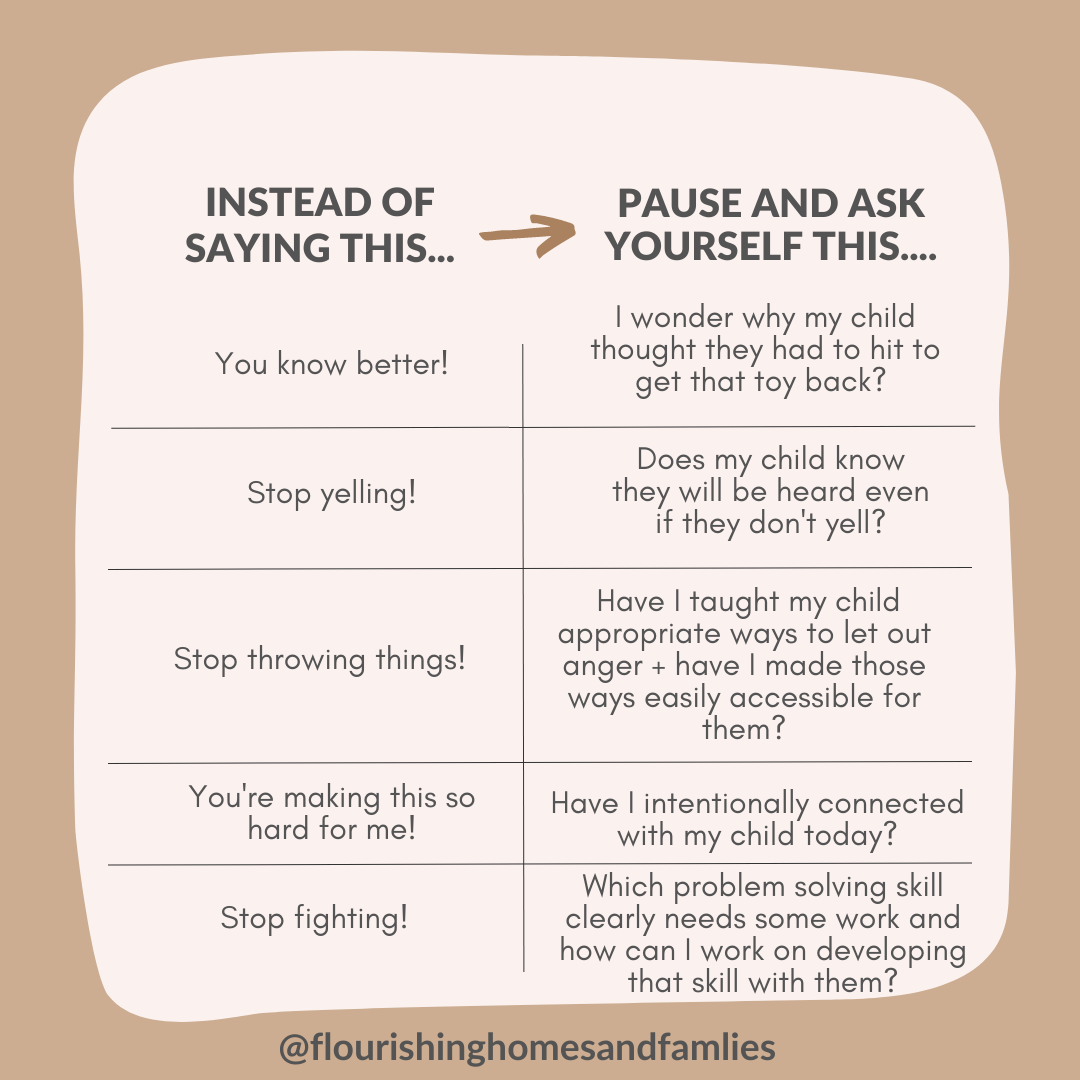
You know better! → I wonder why my child thought they had to hit to get that toy back?
Stop yelling! → Does my child know that they are heard?
Why are you throwing things?! → Have I taught my child appropriate ways to let out anger + have I made those ways easily accessible for them?
You’re making this so hard for me! → Have I connected intentionally with my child today and given them tools to have some alone time while I complete this task?
Stop fighting with your sister/brother! → Which problem-solving skill clearly needs some work and how can I work on developing that skill with them?
I like how James says:
This you know, my beloved brethren. But everyone must be quick to hear, slow to speak and slow to anger; for the anger of man does not achieve the righteousness of God.
James 1:19-10
Sometimes a simple pause to ask ourselves a question before opening our mouths and speaking helps bring peace and the wisdom of God into a situation. This is where we can use the insight of the Lord to see into their hearts and bring them into our peace where they can learn and grow.
I know sometimes these little changes are sometimes much easier said that implemented. And if the implementation of these swaps feels overwhelming, you are not alone. We have a special community that gently holds each other accountable while offering support via zoom calls, emails, messages, group mentoring–all of it! You’re always welcome to join us. CLICK HERE to learn more.
YOU MIGHT ALSO LIKE
 |

I want to talk to you parent to parent.
For many of us, it didn’t take long to see the obvious error + danger that comes with spanking a child to get them to comply. Hitting kids = not good. It isn’t all that difficult to understand.
But what I want to share with you is that being a gentle, peacemaking parent is a whole lot more than just not spanking.
Not spanking does not equal gentle parenting.
The first is a step in the right direction! The latter is a lifestyle that must be learned and practiced consistently by parents.
Being a peacemaker parent comes from an understanding and appreciation for who your children are, who you are, and who Christ is. If that is a new concept to you, you can read more about that here.
Operating as a person of peace in the raising of our children is such a gift to them and goes far beyond the absence of spanking.
If we choose not to spank but continue yelling, shaming, punishing, and other loud and damaging modalities, we are not peacemaker parents!
A peacemaker parent is Christlike + bursting with the fruits of the Spirit.
Questions to ask yourself in a crisis as you cultivate and pursue being a peacemaker:
Am I operating in the fruits of the Spirit (love, joy, peace, patience, kindness, goodness, faithfulness, and self-control) even when confronted with conflict or crisis?
But the fruit of the Spirit is love, joy, peace, patience, kindness, goodness, faithfulness, gentleness, self-control; against such things there is no law. Galatians 5:22-23
How would Jesus answer my child right now?
The one who says that he remains in Him ought, himself also, walk just as He walked. I John 2:6
The one who says that he remains in Him ought, himself also, walk just as He walked. I John 2:6
Are my hands and arms open to give love + grace to my child in their time of need?
I have spread out My hands all day long to a rebellious people, Who walk in the way which is not good, following their own thoughts. Isaiah 65:2
I have spread out My hands all day long to a rebellious people, Who walk in the way which is not good, following their own thoughts. Isaiah 65:2
Is my voice soft + gentle or is it big + scary?
A gentle answer turns away wrath, But a harsh word stirs up anger. Proverbs 15:1
A gentle answer turns away wrath, But a harsh word stirs up anger. Proverbs 15:1
Would I be proud to show someone how I am confronting this situation?
Be diligent to present yourself approved to God as a workman who does not need to be ashamed, accurately handling the word of truth. II Timothy 2:15
Be diligent to present yourself approved to God as a workman who does not need to be ashamed, accurately handling the word of truth. II Timothy 2:15
These questions are hard to ask ourselves sometimes–and we need to remember that the Lord always gives us grace as He empowers us with His Spirit. Chances are, there will be many times that the answers to these questions are "no". But we keep trying and keep working toward the goal of being a peacemaker.
At the end of the day, we do our best as parents. There is no perfect parent, but we do have a perfect model–Jesus Christ. We always look to him. The author and finisher of our faith and we model His methods, His ways, and His teaching the very best that we can as we raise our little disciples to be like Him.
You might also like
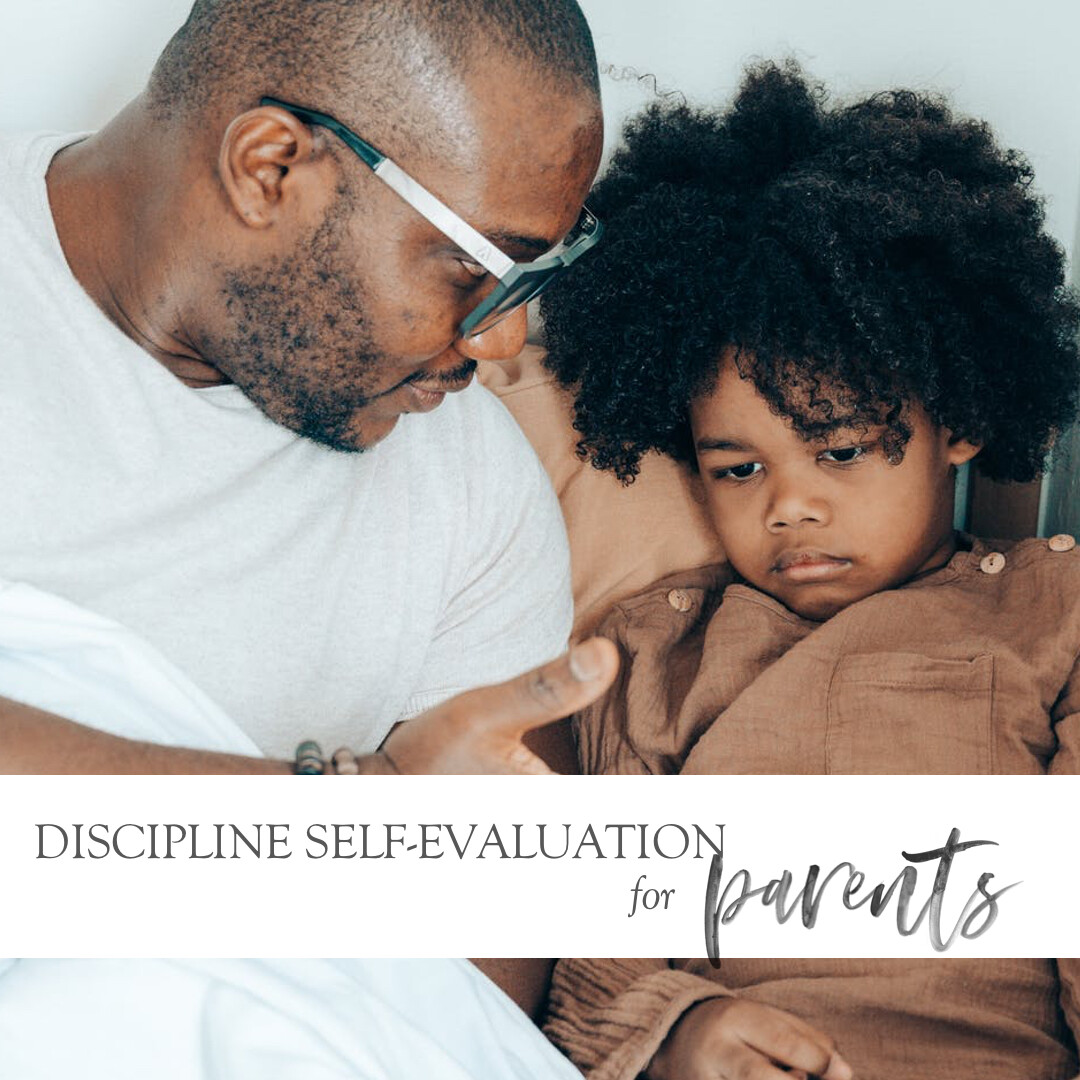 |



















